Navigating the Complexities of Antidepressant Use in Older Adults
Long-term antidepressant use among seniors demands vigilant monitoring to balance therapeutic benefits against heightened risks. This article explores best practices grounded in multidisciplinary care, medication management, and psychosocial interventions to optimize outcomes and minimize adverse effects in this vulnerable population.
Comprehensive Models of Care for Seniors with Mental Health and Substance Use Disorders
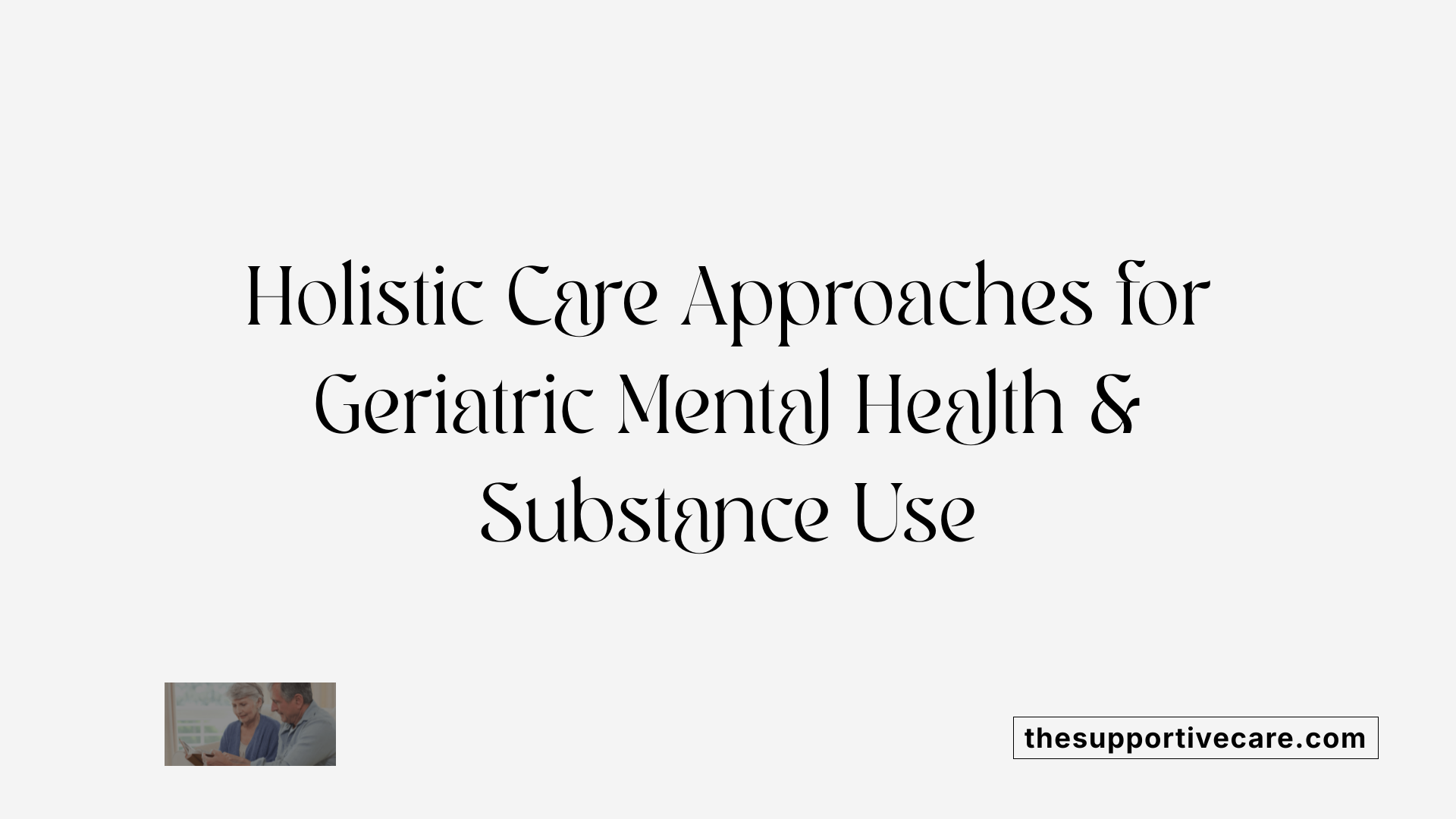
What types of comprehensive treatment services are available for substance abuse and mental health issues?
Comprehensive treatment services for seniors with substance abuse and mental health issues integrate multiple interventions designed to meet diverse individual needs. These services typically include:
- Counseling and Behavioral Therapies: Techniques such as Group Cognitive-Behavioral Therapy (Group-CBT) help address current problems and symptoms by modifying negative thoughts and behaviors.
- Medication Management: Tailored use of medications, including second-generation antidepressants like SSRIs and careful consideration of side effects, especially in older adults.
- Support Groups and Family Therapy: Providing social support and reducing stigma by involving families and peer groups.
- Holistic and Psychosocial Approaches: Lifestyle modifications, physical activity, cognitive training, and mindfulness practices contribute to improved mental health and substance use outcomes.
- Integrated Treatment Models: Coordinated care that simultaneously addresses both mental health disorders and substance abuse ensures comprehensive management of co-occurring conditions.
- Aftercare and Community Services: Ongoing support to promote long-term recovery and social integration.
How do addiction treatment programs address both substance abuse and mental health disorders simultaneously?
Addiction treatment programs for older adults embrace integrated multidisciplinary team care. This model involves:
- Comprehensive Assessments: Early diagnosis and evaluation of both mental health and substance use disorders, alongside cognitive status.
- Coordinated Therapies: Combination of behavioral interventions like Group-CBT and medication tailored to individual medical profiles.
- Holistic Attention to Social Determinants: Addressing factors such as loneliness, social isolation, and stigma that influence both substance use and mental health.
- Collaborative Care Planning: Multidisciplinary teams—including psychiatrists, primary care providers, therapists, and social workers—coordinate treatment efforts for better health outcomes.
This integrated approach acknowledges the complex interplay between mental health and substance use disorders, emphasizing simultaneous management to improve both mental wellness and sobriety.
Coordination of Care Services
To effectively support older adults, care coordination aims to bridge gaps between mental health, substance use treatment, and social services. Key elements include:
- Multidisciplinary teams collaborating on assessment, diagnosis, and treatment planning.
- Regular monitoring and adjustment of pharmacological treatments to minimize side effects common in the elderly.
- Incorporation of psychosocial treatments to reduce reliance on medications where possible.
- Use of emerging biomarkers and neuroimaging to guide personalized care.
Holistic and Psychosocial Approaches
Nonpharmacological interventions are crucial in comprehensive care for seniors, especially considering increased medication sensitivity and polypharmacy risks. These include:
- Lifestyle changes promoting physical activity and cognitive stimulation.
- Psychosocial therapies such as cognitive-behavioral therapy and interpersonal therapy.
- Social support through group sessions and community engagement to combat loneliness.
- Environmental modifications and validation therapies to manage behavioral symptoms in dementia.
Such strategies enhance quality of life and reduce adverse effects related to psychotropic drugs.
| Aspect | Description | Relevance to Elderly Care |
|---|---|---|
| Multidisciplinary Team Care | Collaborative approach integrating various health professionals | Addresses complex needs of co-occurring disorders |
| Integrated Treatment Models | Coordination of mental health and substance abuse therapies | Improves overall outcomes by holistic intervention |
| Psychosocial Interventions | Therapies aimed at behavior and cognitive improvement | Essential to minimize medication burden and enhance function |
| Medication Management | Careful selection and monitoring of pharmacotherapy | Reduces risks associated with polypharmacy and side effects |
| Addressing Social Determinants | Tackling isolation, stigma, and loneliness | Key to sustainable recovery and mental wellness |
Understanding the Unique Vulnerabilities of Older Adults on Antidepressants

Age-Related Pharmacokinetics and Polypharmacy Challenges
Older adults experience changes in drug metabolism and clearance, leading to altered pharmacokinetics which impact antidepressant efficacy and safety. This is particularly significant because many elderly patients are on multiple medications (polypharmacy), increasing the risk of drug interactions that complicate antidepressant therapy. Careful consideration of total medication burden is crucial to minimize adverse reactions.
Increased Sensitivity to Side Effects
The elderly are more sensitive to common antidepressant side effects such as headaches, gastrointestinal disturbances, and sexual dysfunction. Moreover, certain antidepressants like amitriptyline and paroxetine pose higher risks due to their anticholinergic activity and cardiovascular side effects, necessitating cautious use.
Risks of Falls and Fractures
Antidepressants can cause hypotension and dizziness, elevating the risk of falls and fractures—a serious concern in this age group. These safety issues underscore the need for vigilant monitoring and preventive strategies to safeguard patient mobility and independence.
Importance of Individualized Medication Management
Given these vulnerabilities, medication management in older adults must be comprehensive and personalized. Starting doses should be low and titrated slowly, with ongoing assessment of patient preferences, existing comorbidities, concomitant medications, and cost. Strategies like pharmacogenetic testing offer promise for tailoring antidepressant therapy and optimizing outcomes.
In summary, understanding pharmacokinetic changes and balancing polypharmacy challenges with heightened side effect susceptibility is essential for safe and effective antidepressant use in older adults. Individualized treatment planning and vigilant follow-up can help mitigate risks such as falls, ensuring older patients receive the best possible mental health care.
Selecting Antidepressants for Older Adults: Balancing Safety and Efficacy

What are the APA recommendations on second-generation antidepressants for older adults?
The American Psychiatric Association (APA) strongly recommends using second-generation antidepressants when treating depression in older adults. These include selective serotonin reuptake inhibitors (SSRIs), serotonin-norepinephrine reuptake inhibitors (SNRIs), and norepinephrine-dopamine reuptake inhibitors (NDRIs). These classes are preferred due to their favorable safety profiles compared to older antidepressants, making them suitable for the elderly.
Why are SSRIs considered first-line agents for elderly patients?
SSRIs, such as sertraline and escitalopram, are considered first-line treatments among older adults. Their extensive study and relative safety with fewer cardiovascular and anticholinergic side effects make them the preferred choice. SSRIs offer a balance of efficacy and reduced risk, particularly important given the increased vulnerability of older adults to adverse drug reactions.
Which antidepressants should be avoided and why?
Older adults should avoid certain antidepressants like amitriptyline and paroxetine because of their high anticholinergic burden and potential cardiovascular risks. These agents can worsen cognition, increase fall risk, and have unfavorable side effects such as orthostatic hypotension, making them less suitable for geriatric use.
How should comorbidities and drug interactions influence antidepressant selection?
When selecting antidepressants, clinicians must carefully consider the patient's medical comorbidities, existing medications, and potential drug interactions. Older adults often experience polypharmacy and altered pharmacokinetics, which increase the risk of adverse reactions. Tailored medication management considers side effect profiles, interactions, patient preferences, and cost to optimize safety and adherence.
What is the potential role of pharmacogenetic testing?
Pharmacogenetic testing is an emerging tool that may enhance personalized treatment for older adults. It helps identify patients who are slow metabolizers of certain antidepressants, suggesting the need for lower doses. Genetic markers can also predict treatment response, paving the way for more precise and effective therapy while reducing trial-and-error prescribing.
These factors together underscore the importance of a cautious, individualized approach when prescribing antidepressants to the elderly population, focusing on maximizing therapeutic benefits while minimizing risks.
Medication Management Strategies for Long-Term Antidepressant Use in Seniors
How should antidepressant dosing be approached in older adults?
Medication management in seniors emphasizes the principle of "start low and go slow." Because older adults have altered pharmacokinetics and increased sensitivity to side effects, initiating antidepressants at a low dose and gradually titrating upwards helps reduce adverse effects and improves tolerability.
What monitoring practices support safe and effective treatment?
Regular evaluation of therapeutic response and side effects is critical. Clinicians should assess for improvements in depressive symptoms alongside vigilance for potential adverse events like hypotension, falls, hyponatremia, or QT prolongation. Close monitoring ensures timely dose adjustments and enhances safety.
How important is patient education in medication adherence?
Educating patients about the benefits, potential side effects, and the importance of adherence promotes engagement and helps prevent premature discontinuation. Discussions should include expectations about the time required to see improvement, common side effects, and the value of continuing therapy even after symptom resolution.
How can polypharmacy be effectively managed?
Polypharmacy is common in older adults and increases risks of drug interactions and side effects. Reviewing all medications regularly helps identify potentially inappropriate drugs, reduce pill burden, and prevent harmful interactions, thereby improving overall safety in long-term antidepressant use.
How to differentiate withdrawal symptoms from depression relapse?
Withdrawal symptoms from SSRIs/SNRIs, such as dizziness, sensory disturbances, or hyperarousal, can mimic a relapse of depression. Careful clinical assessment during dose reduction or discontinuation is essential to distinguish these and guide appropriate management, including the option of slower tapering or reinstating therapy if needed.
| Strategy | Description | Clinical Considerations |
|---|---|---|
| Start Low, Go Slow | Begin with low dose, increase gradually to minimize side effects | Tailor dosing to individual tolerance and comorbidities |
| Monitor Therapy and Side Effects | Regularly assess symptom improvement and adverse events | Use scales like PHQ-9 and clinical observation |
| Patient Education | Inform on adherence importance, side effects, and treatment expectations | Facilitates adherence and early reporting of issues |
| Manage Polypharmacy | Review all medications to reduce interactions and pill burden | Coordination with pharmacists and specialists recommended |
| Recognize Withdrawal vs Relapse | Differentiate SSRI/SNRI discontinuation symptoms from depressive relapse | Adjust tapering schedule and provide supportive care as needed |
Role and Benefits of Psychosocial Interventions in Treating Geriatric Depression
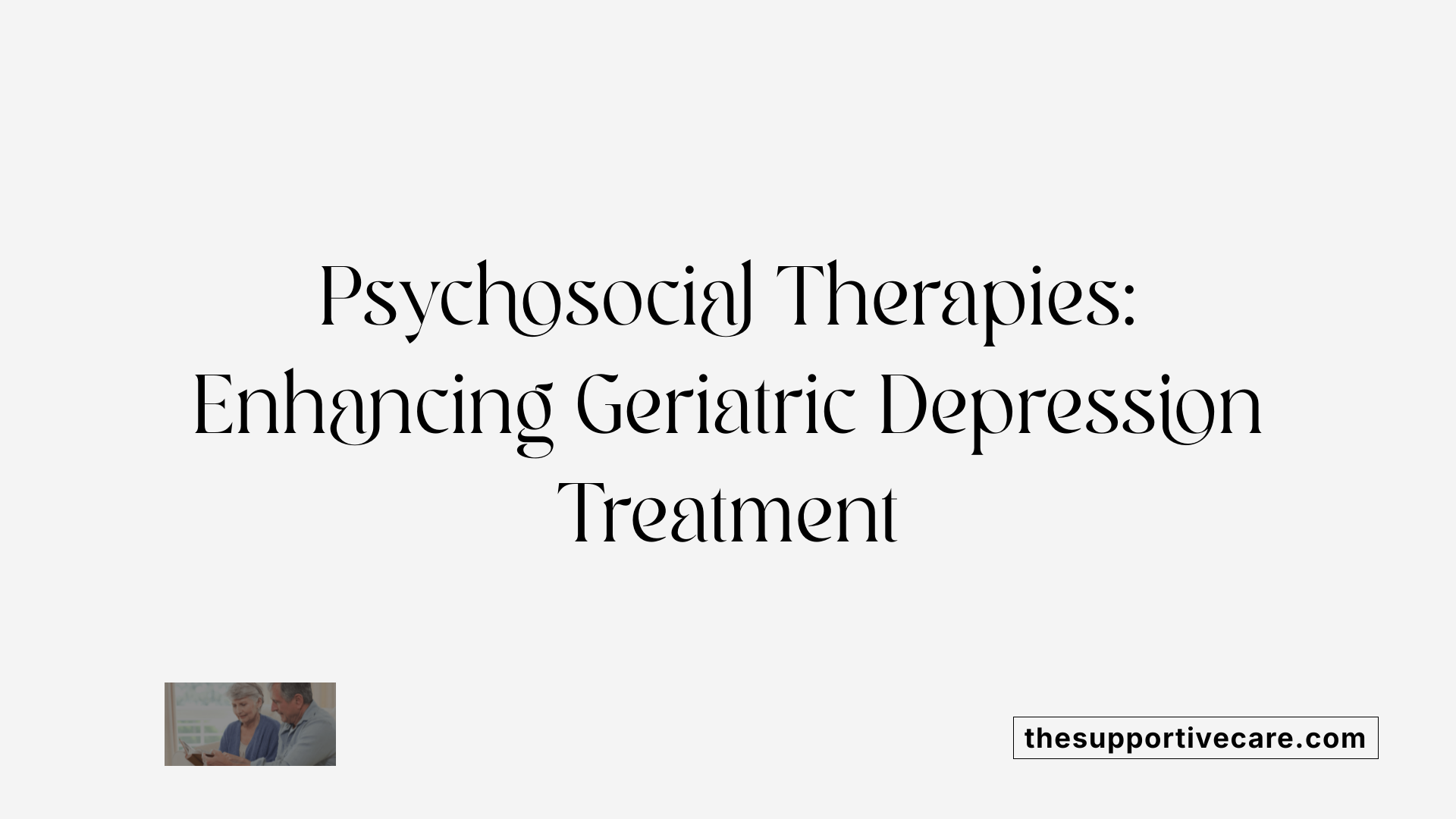
What forms of therapy are most effective in treating various types of addiction?
Among older adults, evidence-based psychotherapy stands out as a cornerstone for treating depression and comorbid substance use disorders. Cognitive-behavioral therapy (CBT) and interpersonal therapy are especially effective, offering structured approaches that address the complex interactions among thoughts, feelings, and behaviors. Group Cognitive-Behavioral Therapy (Group-CBT) has been shown to be effective in this population, typically involving 7 to 15 weekly sessions. It emphasizes activities such as maintaining mood diaries, identifying negative thought patterns, and engaging in pleasurable activities to improve mood.
How does Group-CBT support treatment?
Group-CBT facilitates peer support while focusing on real-time issues and symptom management. It encourages homework assignments and continuous patient engagement beyond therapy sessions. Such psychosocial treatment enhances coping mechanisms and complements pharmacological approaches.
Combining pharmacological and psychosocial treatments
For optimal outcomes in geriatric depression and substance abuse, combining pharmacological treatments—such as second-generation antidepressants—with psychosocial interventions offers significant benefits. This dual approach improves symptom relief and reduces relapse rates.
Supporting patients and clinician training
Effective delivery of psychosocial therapies relies heavily on patient support mechanisms and well-trained clinicians. Enhancing clinician skills through specialized training ensures adherence to treatment protocols and optimizes patient outcomes.
Nonpharmacological interventions for behavioral symptoms
In addition to psychotherapy, nonpharmacological methods such as activity therapy, reminiscence, validation, and multisensory stimulation are recommended particularly for behavioral symptoms in dementia and late-life depression. These interventions reduce reliance on medications and improve overall functioning and emotional well-being.
Together, these psychosocial interventions form a comprehensive strategy that is crucial for addressing the mental health needs of older adults, balancing efficacy with safety, and tailoring care to individual circumstances.
Early Diagnosis and Comprehensive Assessment: Cornerstones of Effective Monitoring

How is depression screened in older adults?
Routine screening is essential for detecting depression in older adults, particularly those aged 65 and above. Primary care providers commonly use the Patient Health Questionnaire-9 (PHQ-9), a practical tool that helps identify symptoms and severity of depression efficiently. Positive screenings necessitate further diagnostic evaluation to ensure accurate treatment planning.
Why evaluate comorbidities and cognitive disorders?
Older adults often present with complex clinical pictures involving depression alongside cognitive impairments or substance use disorders. Evaluating for comorbid cognitive disorders such as dementia and delirium is crucial, as overlapping symptoms can blur diagnoses. Differentiating among these conditions allows for tailored interventions that address all underlying issues comprehensively.
How are depression, delirium, and dementia differentiated?
Clinicians must carefully distinguish late-life depression from delirium and dementia due to varying prognosis and treatment approaches. Delirium is an acute, fluctuating state usually linked to medical causes and demands prompt identification. Dementia involves progressive cognitive decline, while depression might manifest with mood symptoms alongside cognitive complaints. A thorough clinical assessment supported by reliable tools aids this differentiation.
What roles do biomarkers and neuroimaging play?
Advances in biomarkers and neuroimaging techniques have begun to support early detection and differentiation of neurocognitive disorders in older adults. These tools contribute valuable biological insights that complement clinical assessments, enhancing diagnostic accuracy and informing integrated care models.
Why is a thorough diagnostic workup before treatment important?
Given the complexities and risks in older patients, including medication sensitivity and comorbidities, a comprehensive diagnostic process is vital to optimize treatment safety and efficacy. It ensures that interventions are appropriately targeted, whether pharmacological or psychosocial, and reduces risks associated with misdiagnosis or incomplete evaluation.
Addressing Social Determinants Affecting Mental Health in Older Adults

How Do Loneliness, Social Isolation, and Stigma Impact Mental Health in Older Adults?
Loneliness, social isolation, and stigma significantly influence mental health and substance use disorders among older adults. These social determinants can exacerbate feelings of depression and anxiety, increasing the risk of substance misuse and interfering with treatment engagement. Loneliness and isolation often contribute to a decline in quality of life, impair independence, and are linked to higher rates of suicide in this population.
How Can Social Support Be Integrated Into Treatment Plans?
Incorporating social support into treatment plans is essential for improving mental health outcomes. Multidisciplinary care teams focus on assessing social factors and linking patients to community resources that reduce isolation. Group Cognitive-Behavioral Therapy (Group-CBT) not only addresses mood and behavior but also fosters peer support, creating a sense of belonging among participants.
What Role Do Lifestyle Changes Play in Preventing Relapse?
Relapse prevention strategies include lifestyle modifications such as increased physical activity, cognitive training, and engagement in pleasurable activities. These approaches help build resilience against depression and substance use relapses by improving mood and cognitive function. Encouraging older adults to maintain social connections and participate actively in their community further supports sustained recovery.
How Does Community Engagement and Psychosocial Support Benefit Older Adults?
Community engagement and psychosocial support reduce stigma and enhance social integration. Programs promoting reminiscence therapy, validation, and multisensory stimulation address behavioral symptoms and mental wellbeing without relying solely on medications. Such interventions empower older adults to regain control over their health and reduce dependence on psychotropic drugs.
Together, these approaches create a comprehensive framework addressing the social determinants critical to enhancing mental health and substance use treatment effectiveness in older adults.
Managing Risks Associated with Psychotropic Medications in Elderly Patients

What are the risks of falls, fractures, and hypotension with psychotropic medications in elderly patients?
Psychotropic medications in older adults heighten the risk of falls and fractures primarily due to their capacity to induce or worsen hypotension. As aging physiology alters cardiovascular response, drugs that lower blood pressure can lead to dizziness and instability. Falls resulting from such side effects represent a serious hazard, contributing to increased morbidity and hospitalization rates among the elderly.
What adverse effects are specific to SSRIs and other antidepressants in older adults?
Selective serotonin reuptake inhibitors (SSRIs) are commonly prescribed for depression in older adults due to their safer profile. Nevertheless, elderly patients often experience increased sensitivity to side effects including headaches, gastrointestinal disturbances, and sexual dysfunction. Some SSRIs are preferred for their relatively lower adverse effect burden. In contrast, certain antidepressants such as amitriptyline and paroxetine are discouraged because of their anticholinergic effects and cardiovascular risks.
Why should benzodiazepines and hypnotics be used with caution in older adults?
Use of benzodiazepines and hypnotics should be limited to 30 days or less in the elderly to minimize risks of cognitive decline, drug dependence, and other adverse effects. Prolonged use can impair alertness and increase fall risk. Short-term, carefully monitored therapy is preferred to balance efficacy and safety in managing anxiety or insomnia symptoms.
How should clinicians monitor for tardive dyskinesia and neuroleptic malignant syndrome?
Antipsychotic medications pose risks such as tardive dyskinesia (involuntary movements) and neuroleptic malignant syndrome (a rare but life-threatening reaction). Guidelines emphasize regular assessment for tardive dyskinesia symptoms and maintaining the lowest effective antipsychotic dose. Monitoring helps prevent severe adverse outcomes and supports early intervention if side effects develop.
What are the guidelines for antipsychotic use in dementia patients?
For behavioral symptoms in dementia, antipsychotic use should be judicious and reserved for cases where nonpharmacological approaches have failed. Atypical antipsychotics are preferred over typical ones due to fewer extrapyramidal side effects, but still carry risks including increased mortality and cerebrovascular events. Careful dose management and ongoing evaluation are critical to minimize harm.
Effectively managing psychotropic medication in elderly patients involves rigorous risk-benefit analysis, vigilant monitoring, and tailoring treatment to individual vulnerabilities to optimize safety and outcomes.
Deprescribing: When and How to Reduce or Stop Long-Term Antidepressants
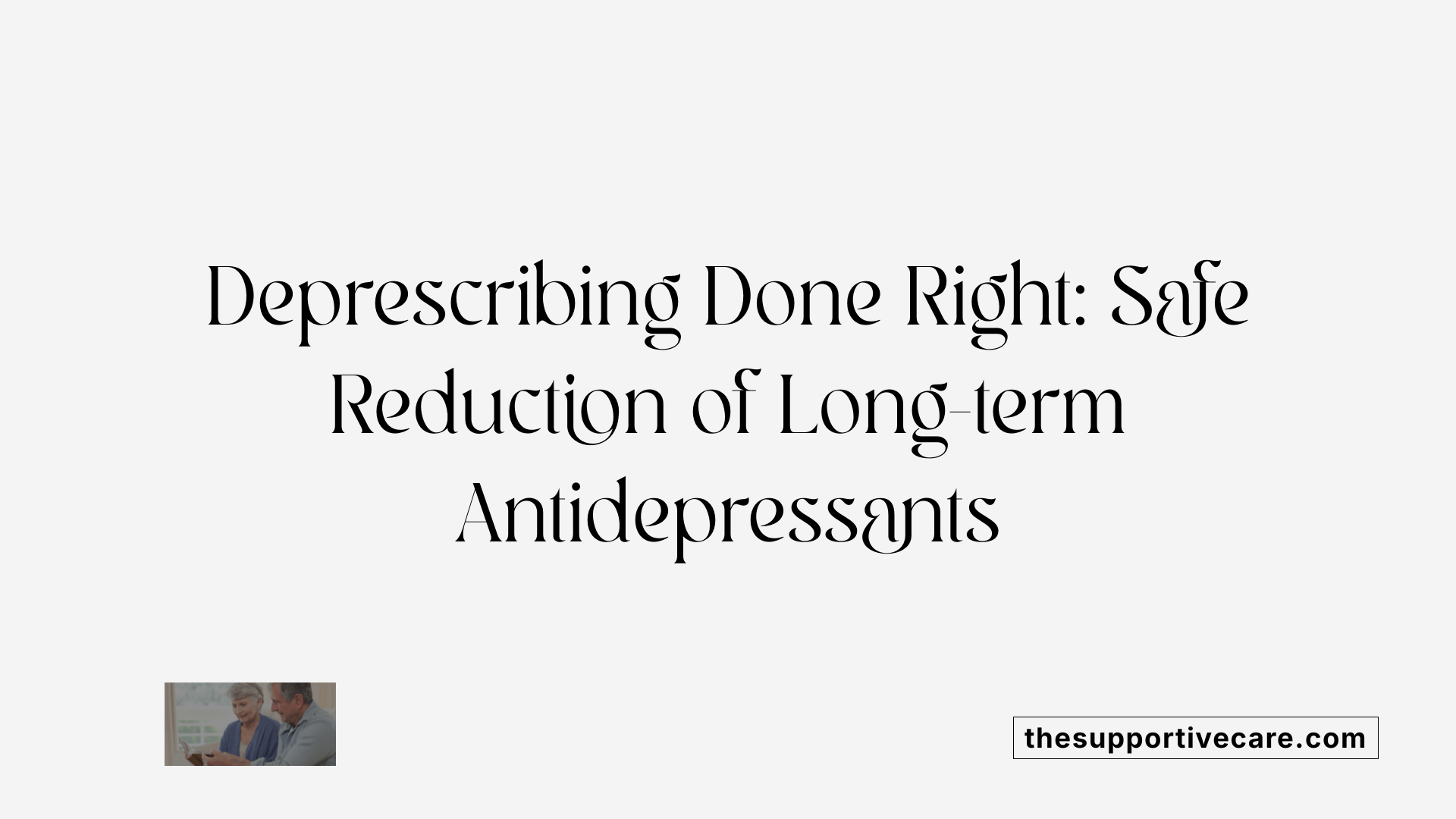
Criteria for Deprescribing in Remission
Deprescribing antidepressants in older adults should be considered primarily when patients are in remission from depression, particularly when symptoms are mild or have resolved. This approach helps avoid unnecessary long-term medication use and minimizes exposure to potential side effects.
Shared Decision Making
Engaging patients in shared decision making is crucial. Older adults should be informed about the benefits and risks of continuing versus stopping medication, allowing them to participate actively in managing their treatment and ensuring their preferences and concerns are respected.
Assessment of Psychiatric History and Risk
A thorough assessment of the patient's psychiatric history and individual risk factors is essential before deprescribing. This includes evaluating prior episodes of depression, comorbid conditions, and current psychosocial support to identify those who may safely discontinue therapy versus those who require ongoing treatment.
Monitoring Withdrawal Symptoms Versus Relapse
During deprescribing, it's important to distinguish between antidepressant withdrawal symptoms and signs of depression relapse. Withdrawal symptoms—such as dizziness, sensory disturbances, and hyperarousal—can mimic recurrence but typically resolve with time. Careful monitoring helps prevent misinterpretation and unnecessary reinitiation of medication.
Consultation Recommendations for Deprescribing
Consultation with mental health specialists is recommended when considering deprescribing, especially in complex cases or those with a history of treatment-resistant depression. Regular follow-up and monitoring ensure safe medication tapering and prompt management if symptoms reemerge.
This measured approach to deprescribing supports individualized care and optimizes outcomes in older adults managing depression.
Treatment-Resistant Depression in Older Adults: Advanced Options and Referral
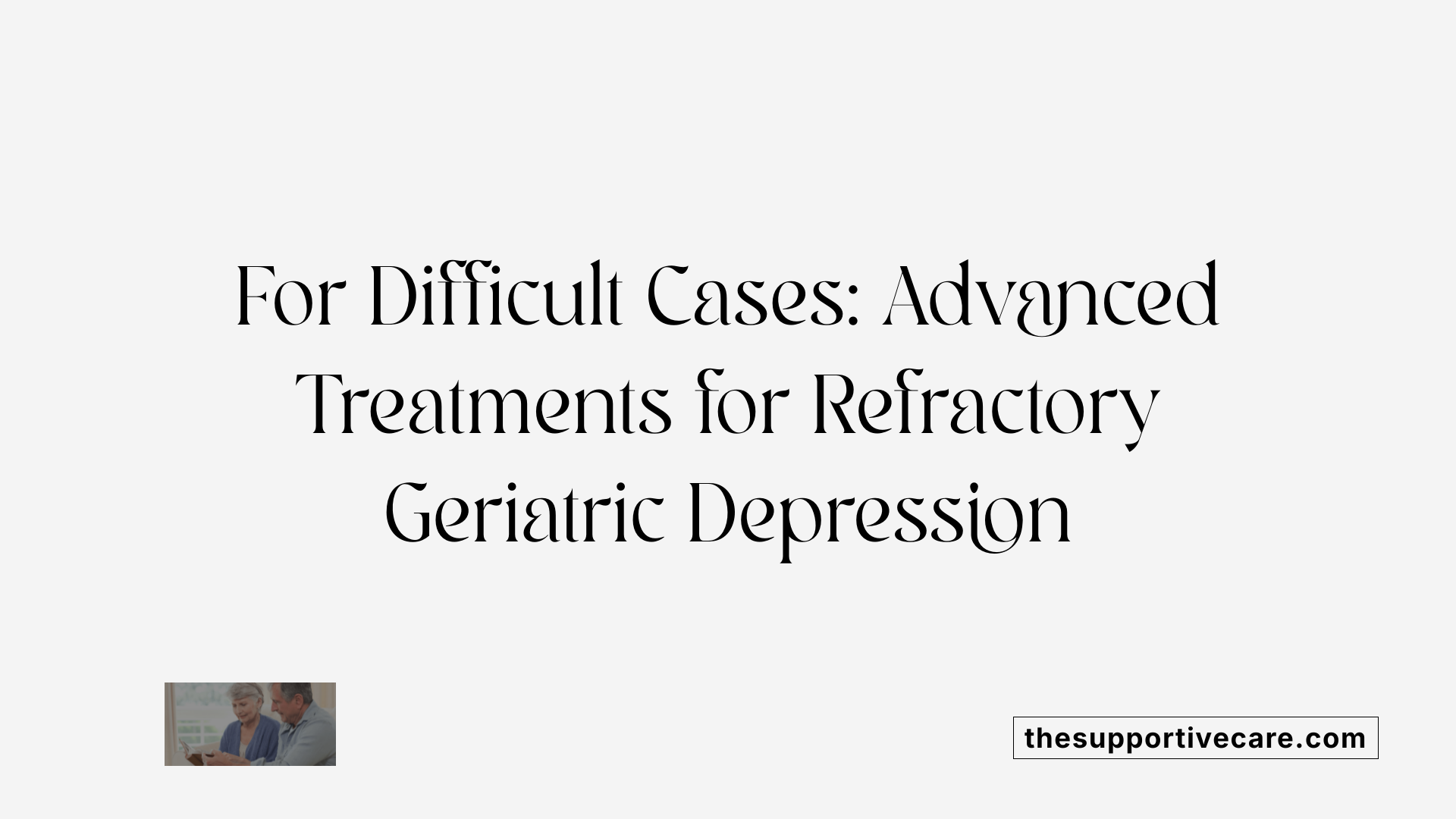
What strategies are recommended for treatment-resistant depression in older adults?
For older adults who do not respond to initial antidepressant treatment, several strategies may be employed. These include switching to a different antidepressant, combining two antidepressant agents, or augmentation with additional medications. Augmentation can involve drugs such as aripiprazole, lithium, or methylphenidate, which may enhance antidepressant efficacy through different mechanisms.
When should older adults with depression be referred to specialists?
Referral to mental health specialists is advisable for older adults with severe depression or those at high risk for suicide. Complex cases that do not improve with standard treatments, or those involving multiple comorbidities, may benefit from specialist evaluation. Specialist involvement also helps optimize treatment planning and management of pharmacological regimens.
What are the indications for hospitalization and electroconvulsive therapy?
Hospitalization may be necessary for patients exhibiting severe depression with suicidal ideation, psychotic features, or those unable to care for themselves. Electroconvulsive therapy (ECT) is a highly effective option recommended for severe or treatment-resistant depression, particularly when rapid symptom relief is needed or when medication side effects limit pharmacological options.
How is suicide risk managed in older adults with depression?
Given the high suicide risk associated with late-life depression, continuous suicide risk assessment and monitoring are essential. Treatment aims to reduce suicidality through effective medication management and psychosocial interventions. Prompt referral and hospitalization may be required for patients with acute suicide risk to ensure safety.
These advanced treatment considerations emphasize the importance of personalized, closely monitored care in managing treatment-resistant depression among older adults to improve outcomes and reduce mortality.
Monitoring and Managing Medication Adherence in Seniors

Why Is Compliance Critical for Safety and Efficacy?
Medication adherence is essential in older adults to ensure treatments for depression and other mental disorders are both safe and effective. Older patients often encounter altered drug metabolism and heightened sensitivity to side effects, which makes following prescribed regimens crucial to avoid adverse events like falls, fractures, and drug interactions.
How Can Education Support Patients and Caregivers?
Educational efforts aimed at both patients and caregivers enhance understanding of medication benefits, side effects, and the importance of consistent use. Providing clear guidance about dosing schedules, expected outcomes, and potential withdrawal symptoms—such as dizziness or sensory changes that might mimic relapse—empowers patients and their support networks.
What Is the Role of Healthcare Coordination?
Effective adherence requires seamless coordination among multidisciplinary teams including primary care providers, psychiatrists, pharmacists, and nursing staff. Such collaboration facilitates regular monitoring, dose adjustments, and timely interventions when complications or adherence barriers arise.
How Should Polypharmacy and Drug Interactions Be Addressed?
Many elderly patients use multiple medications, increasing the risk of harmful interactions and side effects, particularly with psychotropic drugs. Routine medication reviews and deprescribing when appropriate help minimize risks. Tailoring prescriptions by considering pharmacogenetic testing can further refine treatment safety.
What Tools and Technologies Support Adherence?
Modern solutions such as electronic reminders, pill organizers, and digital adherence monitoring devices assist seniors in maintaining their medication schedules. These tools also allow clinicians and caregivers to track adherence patterns remotely and intervene promptly when lapses occur.
Together, these strategies foster safer and more effective management of antidepressant and psychotropic therapies for older adults, improving outcomes and quality of life.
Integrating Lifestyle Modifications and Prevention Strategies in Long-Term Care
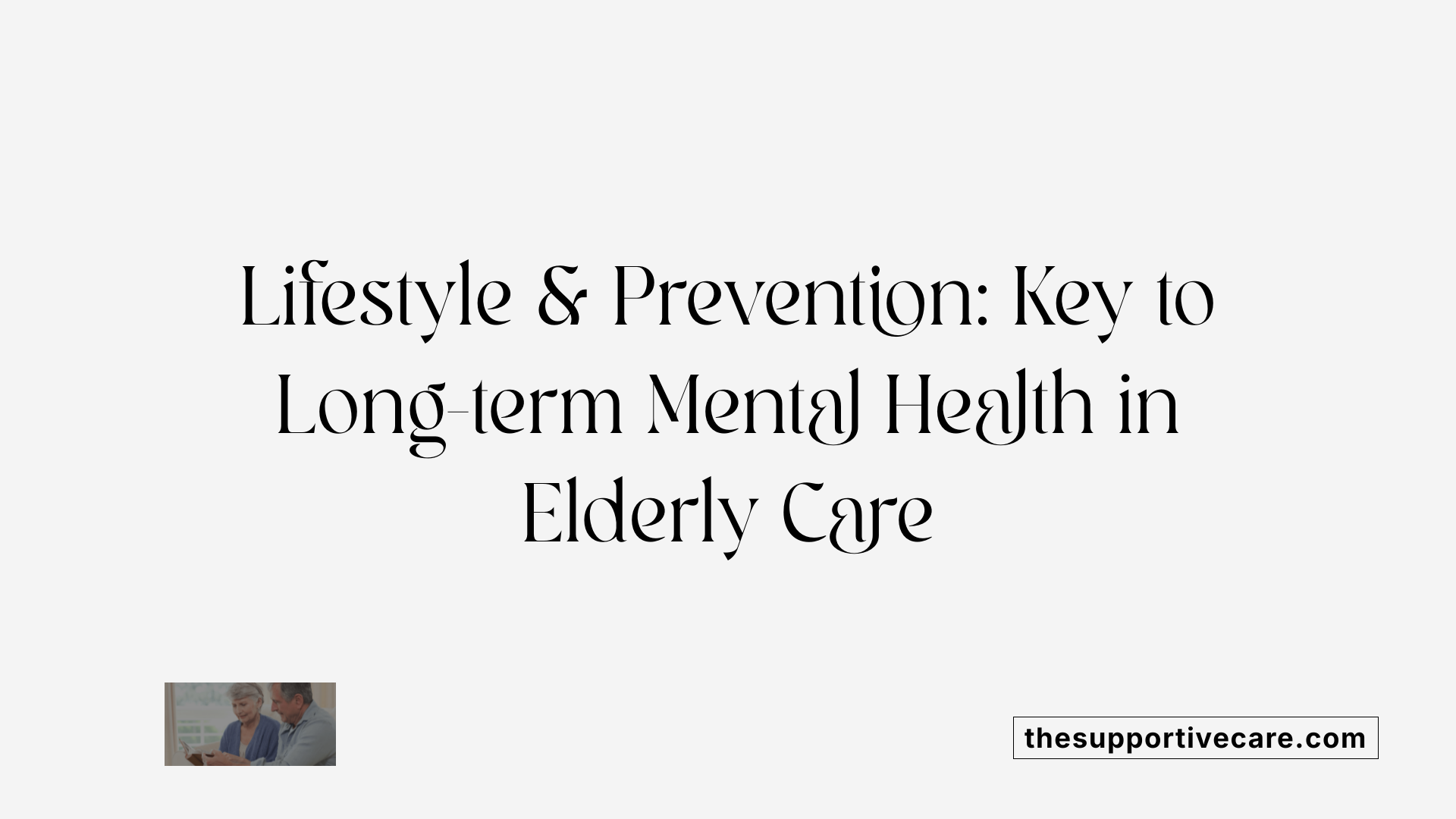
What are the benefits of physical activity for older adults?
Physical activity plays a crucial role in improving mental health outcomes for older adults. Regular exercise enhances mood, reduces symptoms of depression, and can lower the risk of substance use relapse. It also supports cognitive function, helping to preserve memory and processing speed, which are often affected by aging.
How do cognitive training and stimulation contribute to mental well-being?
Cognitive training involves targeted activities designed to improve specific brain functions such as memory, attention, and problem-solving. These interventions help maintain cognitive abilities, delay progression of neurocognitive disorders, and promote independence. Combining cognitive stimulation with other therapies can reduce depressive symptoms and support recovery in substance use disorders.
Why are nutrition and sleep hygiene important in mental health care?
Adequate nutrition supplies essential nutrients that support brain health, mood regulation, and energy levels in older populations. Similarly, good sleep hygiene improves restorative sleep, which is critical for mental and physical well-being. Poor sleep can exacerbate depression and increase vulnerability to substance misuse.
What stress reduction techniques are recommended for older adults?
Stress management strategies such as mindfulness meditation, relaxation exercises, and behavioral therapies have been shown to decrease anxiety and depressive symptoms. Incorporating these methods into care supports emotional balance and resilience, which are vital in managing both mental health and substance use issues.
How do these lifestyle changes impact depression and substance use outcomes?
Integrated lifestyle modifications have a preventative effect by reducing risk factors like loneliness and social isolation. They also complement medical treatments by improving overall well-being and adherence to therapy. Multidisciplinary team care that includes these elements strengthens the therapeutic approach and enhances long-term outcomes in depression and substance use disorders among the elderly.
| Strategy | Benefits | Relevance to Mental Health and Substance Use |
|---|---|---|
| Physical Activity | Enhances mood, cognitive health | Reduces depression symptoms, lowers relapse risk |
| Cognitive Training | Maintains brain function | Delays cognitive decline, supports recovery |
| Nutrition & Sleep | Supports brain, mood, energy | Prevents mood worsening, supports medication effects |
| Stress Reduction | Decreases anxiety, emotional distress | Builds resilience against depression and substance use |
These combined preventive strategies form an essential component of comprehensive care models tailored for older adults coping with mental health and substance abuse challenges.
Policy and System-Level Interventions to Improve Mental Health Care Access for Seniors

Expanding the Mental Health Workforce
One of the primary policy efforts to enhance mental health care for older adults involves expanding the mental health workforce specialized in geriatric care. Given the increasing prevalence of depression and other mental health conditions among seniors, more trained professionals are needed to provide adequate assessment, therapy, and medication management.
Increasing Medicare Coverage for Services
Increasing Medicare coverage for mental health services is another crucial strategy. Broader coverage facilitates access to psychotherapy, medication treatment, and integrated care models for elderly patients, many of whom depend on Medicare for health insurance. Enhanced coverage reduces financial barriers and encourages more seniors to seek timely treatment.
Addressing Disparities and Organizational Barriers
Persistent disparities and organizational barriers hinder access to quality mental health care among older adults, especially marginalized groups. Efforts must focus on reducing provider bias, overcoming logistical barriers, and improving systemic coordination. Streamlining referral pathways and integrating mental health into primary care settings can help mitigate these challenges.
Training and Dissemination of Evidence-Based Practices
Effective adoption of evidence-based practices requires comprehensive training for providers and dissemination of decision support tools. Providing kits and continuous education helps clinicians deliver empirically supported treatments like cognitive-behavioral therapy tailored to older adults. This approach promotes higher quality care and better treatment outcomes.
Advocacy for Integrated Service Delivery
Advocacy encourages system-level changes toward integrated service delivery models. Multidisciplinary teams combining mental health, substance use, and cognitive disorder experts ensure comprehensive assessment and management of comorbidities. Policy initiatives supporting these models improve coordination and the overall effectiveness of interventions.
Collectively, these policy and system-level interventions aim to close the treatment gap for mental health conditions in seniors by enhancing workforce capacity, expanding insurance benefits, reducing disparities, emphasizing training, and fostering integrated care delivery.
Addressing the Treatment Gap: Overcoming Barriers in Elderly Mental Health Services
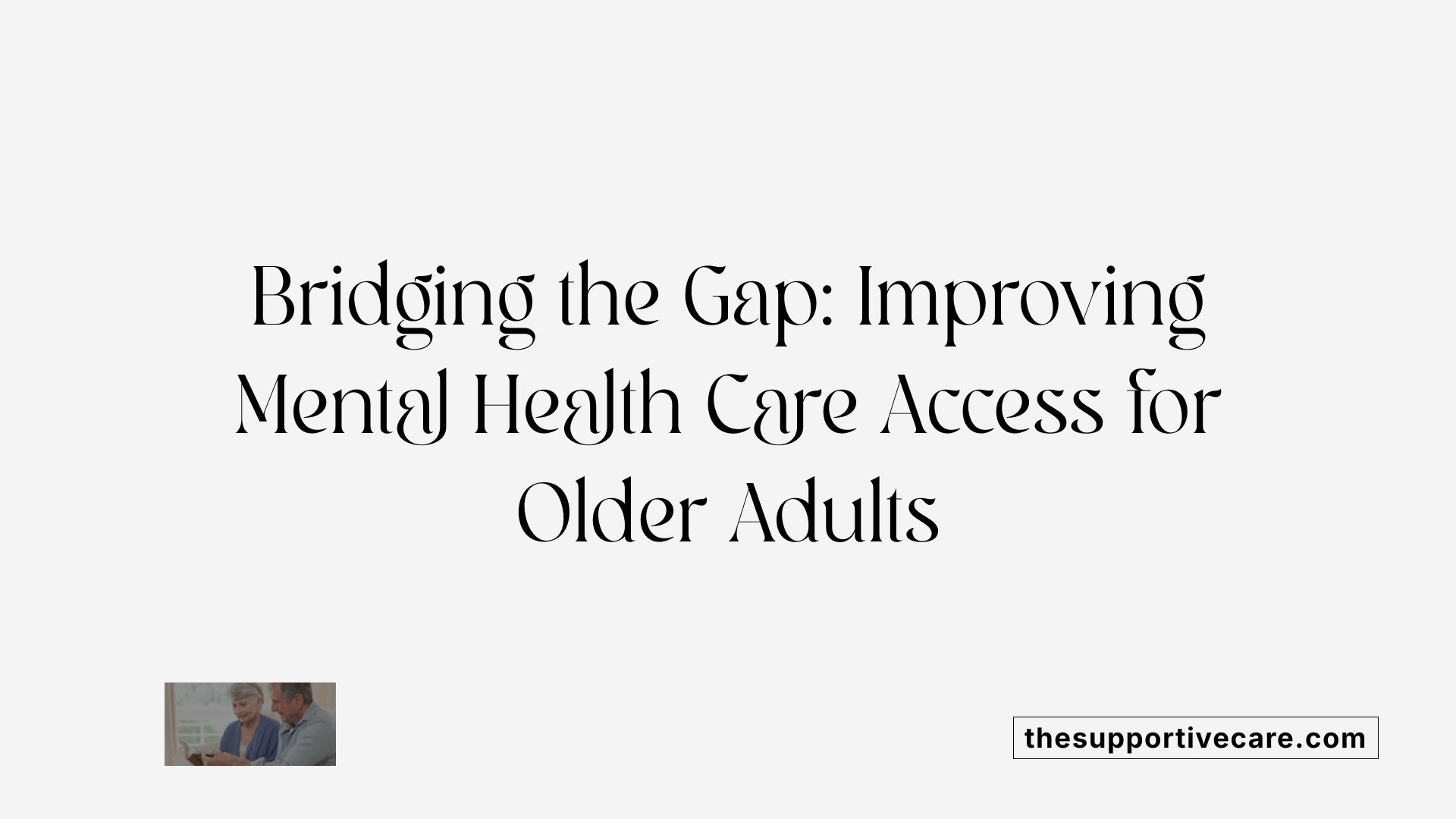
Why Are Depression and Mental Health Conditions Often Underdiagnosed and Undertreated in Older Adults?
Depression and other mental health disorders frequently go unrecognized in elderly populations due to subtle symptom presentations and the tendency to attribute symptoms to aging or physical illness. Many older adults do not report psychological symptoms, and clinicians may overlook screening, leading to significant underdiagnosis.
How Do Provider Bias and Training Insufficiencies Contribute to the Treatment Gap?
Healthcare providers sometimes hold biases that milder symptoms in older adults need less attention or mistakenly normalize depressive symptoms as age-related issues. Insufficient training on geriatric psychiatry limits clinicians' ability to accurately diagnose and manage complex mental health conditions in this demographic.
What Organizational Challenges Impede Effective Mental Health Service Delivery?
Fragmented care systems, limited mental health workforce, inadequate integration of services, and lack of coordinated care plans hinder timely access and comprehensive treatment. Financial and policy obstacles further exacerbate disparities in service availability and quality for older adults.
What Strategies Can Improve Coordination and Communication Among Providers?
Implementing multidisciplinary team models promotes holistic assessment and tailored interventions. Enhancing communication through shared electronic records and decision support tools facilitates continuity and responsiveness in care for complex comorbidities.
How Can Stakeholder Engagement Enhance Outcomes in Elderly Mental Health Care?
Involving patients, families, caregivers, clinicians, and policymakers creates shared ownership of treatment processes, enabling better adherence, destigmatization, and adoption of evidence-based practices. Training programs and dissemination kits support providers, while advocacy drives systemic reforms to bridge the treatment gap.
Special Considerations in Nursing Home and Long-Term Care Settings

High Prevalence of Psychotropic Medication Use in Nursing Homes
Psychotropic medications are extensively used in nursing homes, with 87% of residents with dementia receiving at least one such drug. Many take multiple agents to manage behavioral and psychiatric symptoms common in this population. This high prevalence underscores the importance of vigilant medication management.
Monitoring Polypharmacy and Adverse Reactions
Older adults in long-term care settings are vulnerable to adverse effects due to altered pharmacokinetics and polypharmacy. Risks include hypotension leading to falls and fractures, anticholinergic effects, QT prolongation, hyponatremia, and drug interactions. Careful monitoring to detect side effects, regular assessment for tardive dyskinesia, and individualized dosing are critical to minimize harm.
Nonpharmacological Interventions for Behavioral Symptoms
Non-drug approaches such as activity therapy, reminiscence, validation, and multisensory stimulation play a vital role in managing behavioral symptoms in dementia. These methods can reduce dependence on medications and improve patient engagement and quality of life.
Staff Training and Support
Effective multidisciplinary teams, including adequately trained staff, are essential for delivering comprehensive care. Training caregivers in psychosocial therapies and behavioral management techniques supports safer, more effective treatment and enhances team coordination.
Balancing Safety with Symptom Control
While antipsychotic medications may be used when environmental and psychosocial interventions fail, their serious risks—such as increased mortality and cerebrovascular events—demand the lowest effective dosages and constant risk-benefit evaluation. Striking a balance between ensuring safety and controlling distressing symptoms is a cornerstone of quality care in these settings.
The Role of Pharmacogenetics in Personalizing Antidepressant Therapy for Seniors

Genetic Factors Influencing Metabolism and Response
Pharmacogenetics explores how genetic differences impact an individual's response to medications, including antidepressants commonly prescribed to older adults. Variations in genes affecting drug-metabolizing enzymes can alter how seniors process antidepressants, impacting both efficacy and side effects.
Dose Adjustments for Slow Metabolizers
Older adults identified as slow metabolizers through pharmacogenetic testing may require lower doses to avoid increased drug levels that heighten the risk of adverse effects. Tailoring dosages helps minimize risks such as falls or cardiovascular complications often associated with antidepressant use in the elderly.
Predicting Treatment Outcomes
Genetic markers hold promise in predicting which patients are more likely to respond favorably to specific antidepressants. This insight enables clinicians to select medications with higher chances of success, reducing the trial-and-error period in managing depression among seniors.
Potential to Reduce Side Effects and Improve Adherence
By aligning antidepressant choices with genetic profiles, pharmacogenetic testing can reduce unpleasant side effects that often lead to medication discontinuation. Improved tolerability fosters better adherence, ultimately enhancing treatment outcomes and quality of life for older adults.
Future Directions in Personalized Medicine
As research advances, integrating pharmacogenetics into routine clinical care could become standard practice. This progress supports multidisciplinary teams in delivering tailored mental health care, addressing complex cases where comorbid conditions and polypharmacy are prevalent among elderly patients.
Supporting Families and Caregivers in Monitoring and Managing Long-Term Antidepressant Use
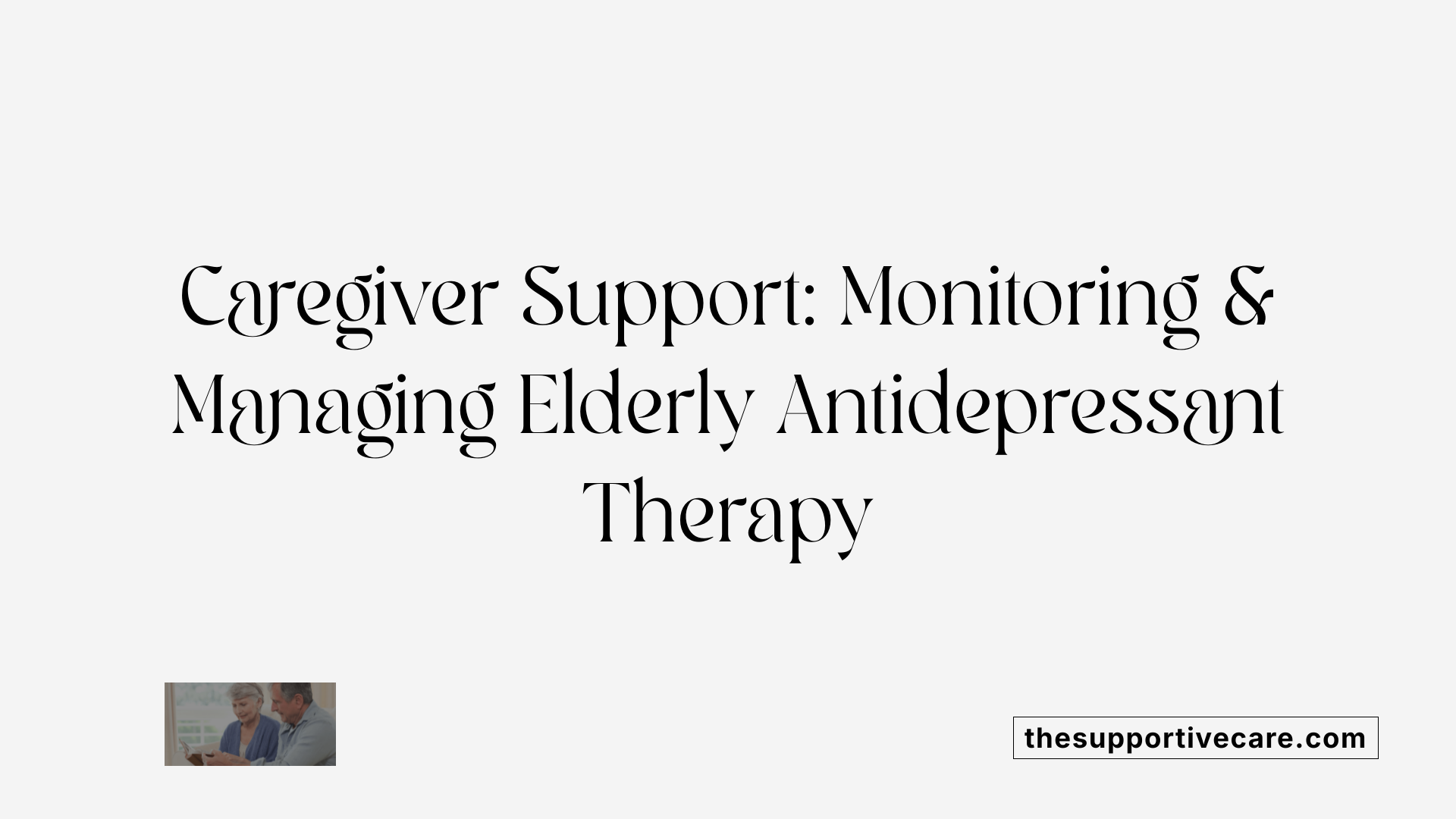
The Importance of Educational Resources for Families
Families and caregivers of older adults on long-term antidepressant medications need access to clear and practical educational materials. These resources should explain the purpose of treatments, possible side effects, and the importance of adherence. Understanding treatment goals helps families support loved ones more effectively and recognize when professional help is needed.
Recognizing Signs of Adverse Effects or Relapse
Caregivers play a critical role in monitoring for adverse effects such as dizziness, gastrointestinal issues, or weight changes, which are common with SSRIs and other antidepressants in the elderly. They should also be vigilant for symptoms suggesting relapse or withdrawal, such as mood changes or sensory disturbances, and communicate concerns promptly to healthcare providers.
Promoting Adherence and Communication with Providers
Promoting consistent medication adherence is vital, especially given the increased risks older adults face from missed doses or abrupt changes. Families should maintain open communication with prescribing clinicians, providing updates on the patient’s condition, side effects, or changes in behavior. This collaborative approach facilitates timely medication adjustments and ensures safer care.
Involvement in Psychosocial Interventions
Families can support participation in psychosocial treatments like cognitive-behavioral therapy by encouraging attendance and engagement. Their involvement improves outcomes by reinforcing therapy goals at home and fostering motivation. Educating caregivers about these therapies strengthens their role in comprehensive mental health management.
Addressing Caregiver Stress and Stigma
Managing long-term antidepressant use can be stressful for caregivers, especially when compounded by societal stigma around mental illness. Providing support networks and counseling referrals can alleviate stress and empower families. Reducing stigma encourages more open discussion about mental health needs, improving care quality and emotional well-being for all involved.
A Holistic Path Forward for Safe Antidepressant Use in Seniors
Monitoring seniors on long-term antidepressant therapy requires a multifaceted strategy that combines individualized medication management, evidence-based psychosocial interventions, and attention to social and systemic factors. By employing integrated, team-based care and prioritizing patient-centered approaches, healthcare providers can mitigate risks, enhance treatment adherence, and improve quality of life. Continued research, policy support, and education remain vital to advancing best practices and closing the treatment gap for this vulnerable population.
References
- Mental health care for older adults: recent advances and new ...
- Depression Treatments for Older Adults
- Optimizing the Treatment of Late-Life Depression
- Psychotropic Medication Use among Older Adults
- Evidence-Based Practices in Geriatric Mental Health Care
- Medication Management, Antidepressant Drugs, and the Elderly
- An Approach to Deprescribe Antidepressants for ...


































































































